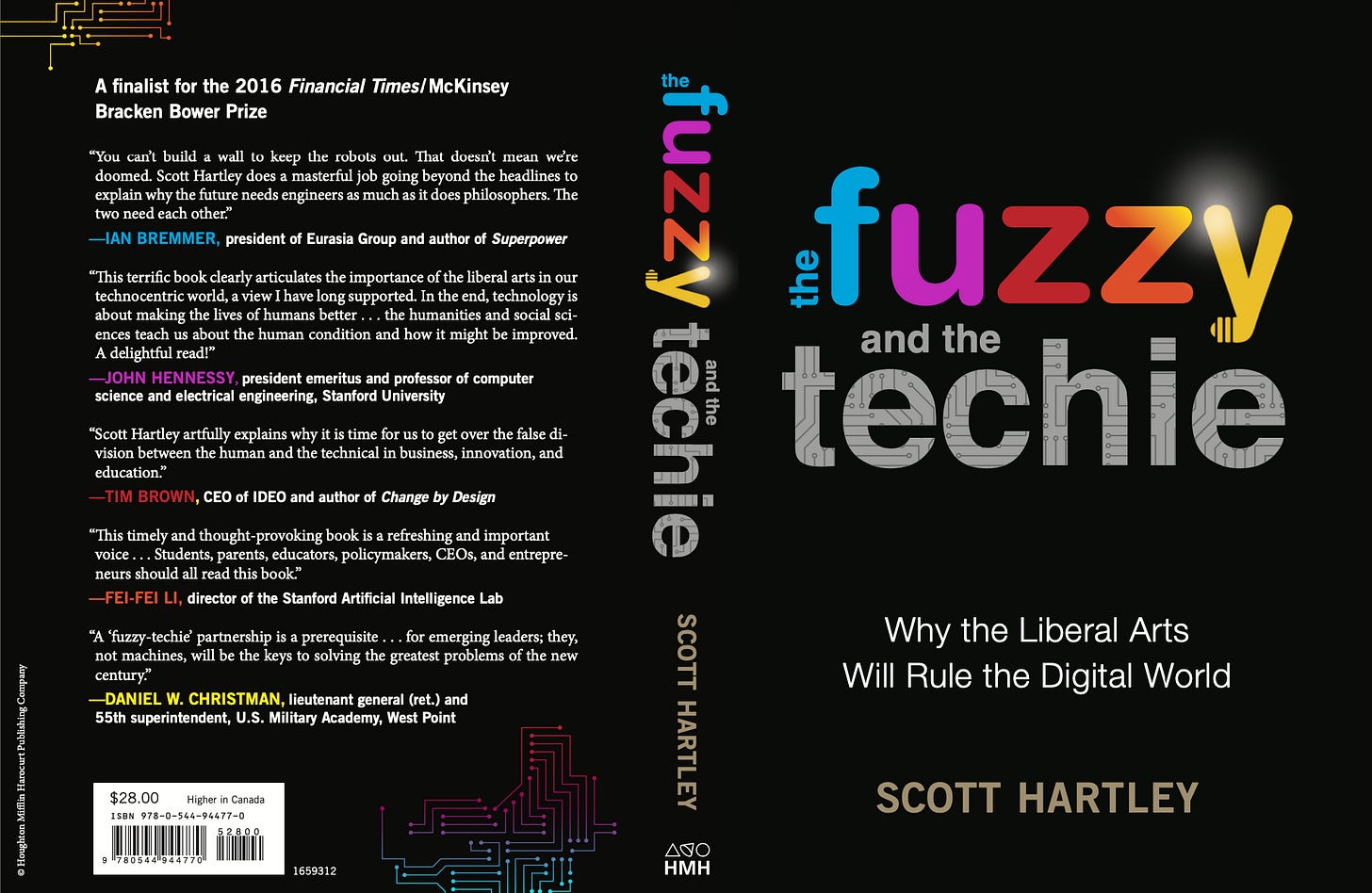Humanities: Our Future Superpower
Joining Virginia Tech as an Honorary Advisor
I had the great pleasure of joining Virginia Tech President Tim Sands in fireside chat about the future of technology, and why the Humanities, of all things, is becoming central to technology. At the invitation of Professor Rishi Jaitly and Associate Vice Provost Sylvester Johnson, President Sands and I engaged in a lively conversation about this new era of artificial intelligence (AI) and how it is empowering, not replacing human ingenuity. In other words, it’s about intelligence amplification (IA), and the ways in which these new waves of technology are enhancing productivity.
Virginia Tech is a special institution. As a land grant college it has a deep tradition in America’s history, and in broadening the reach of education, and preparedness. Many fail to recognize that the full name of “Virginia Tech” is actually Virginia Polytechnic Institute and State University, and its mandate is far broader than engineering. As a State University they are a full Liberal Arts college in addition to engineering. Virginia Tech is building out a multi-billion dollar partnership with Amazon around the new Alexandria, Virginia HQ2, and a machine learning center, but the power of machine learning is in its application to industry-specific data sets, and knowing what data to pay attention to, and how to mitigate bias in its collection, remain two of the greatest challenges. This is why participants in these programs will come from the Humanities and Social Sciences, in addition to just backgrounds in computer science and engineering. Plurality of disciplinary exposure makes these new tools less prone to miscalculation, and less prone to bias or misapplication.
Our comparative advantage has always come from owning what it means to be deeply human. The study of what it means to be human is called the Humanities. Philosophy engages how and why we exist, Psychology how we relate to one another and to ourselves, Ethics our means of interacting morally, History the ways in which we have succeeded and failed over the centuries, and Literature our ability to share these stories, lessons, failures in anecdotal, personal form. The Humanities embody, at their core, the pantheon of topics relating to a human life. Moreover, the social sciences extend these core disciplines with Anthropology examining how we interact, Sociology and Political Science how we self-organize to problem solve, and Economics in how we coordinate resources and task trade across various talent endowments. The Humanities and Social Sciences, in addition to the Sciences, make up what we call the Liberal Arts (artes liberales), the broad based educational paradigm meant to free the mind from the bounds of bias by pulling on it in all directions.
The new Virginia Tech Institute for Leadership in Technology (LIT) will enable mid-career executives to double-down on distinctly “human skills” in this new era of technological adaptation. While exploration of the latest tools, the timely, is invaluable, so too is a relationship to the timeless core of human nature. Executives who seek more grounding, more reflection, more engagement with how to navigate these fast-moving times, might ironically, actually need to slow down. I’m excited to have joined Virginia Tech LIT as an Honorary Advisor alongside fantastic peers and individuals who value the Humanities and Liberal Arts in this tech-led era.
When Midjourney AI can create an image in another’s likeness, or OpenAI’s Chat GPT can generate words on the page with simple direction people are beginning to ask, “is this the end of jobs?” No, it is the expansion of productivity, and it necessitates greater creative thinking. For 25 years we have had the Google search bar behind which every detail of human knowledge exists. But have we ceased to ask questions? How many times have we sat in front of a blinking cursor and not known how to command technology to work for us? This is only the fault of our curiosity, and our ability to articulate what it is we actually want from technology. Generative AI is generative, it can create and produce. But it cannot generate ipso facto without stewardship, not without questioners, not without scaffolding. We have all become editors, stewards, questioners. Physicists have long been aided by complex computers performing computations, and they’ve long up-skilled to the harder task of asking the deep cosmological questions. What do we want to know? Where should we point the technology? The world will continue to change, but directionally we are being forced to become more human, not less. And we must invest in cutting edge programs like being pioneered at Virginia Tech, not merely debate the loss of jobs.
President Tim Sands, Professor Rishi Jaitly, and Associate Vice Provost Sylvester Johnson are pioneering a program that looks at how we develop the right scaffolding in leadership to ask the questions, and steer the technology. The answer is not more MBAs and management frameworks; it’s greater depth of self-inquiry. Thank you for including me, and The Fuzzy and the Techie, in your bold vision.
Stay tuned for more thinking on our new platform, Full Stack Human.




